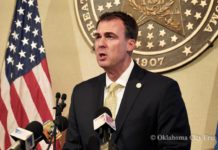Last Updated on October 27, 2023, 5:22 PM | Published: October 25, 2023
OKLAHOMA CITY — An increasingly politicized fight over what is taught in public schools has caused growing alarm that Oklahoma, as a result, could be losing out on quality textbook publishers and curriculum providers, including one of the few companies that tailors its materials to the state’s academic standards.
Already eight companies have withdrawn from consideration ahead of an expected vote on math materials next month by the Oklahoma Textbook Committee. The committee must select the approved list of math textbooks for schools to use over the next six years.
Former state officials who were part of the textbook adoption process say the number of vendors withdrawing this year is remarkably high.
As conservative voices continue to scrutinize classroom content, the officials said schools could be left with fewer textbooks that meet the rigorous standard of review in Oklahoma, a small-market state that already has limited leverage with the publishing industry.
“It’s really just a matter of having opportunities,” said Levi Patrick, executive director of the Tulsa Regional STEM Alliance. “These are just fewer opportunities for schools and teachers to choose from, and that means that some brilliant way of teaching that may have worked for children in our state is being withheld without our having an opportunity at insight into it.”
Eight out of 17 companies remain
Seventeen companies initially asked to be considered in this year’s math textbook adoption process, according to records the Oklahoma State Department of Education provided. Eight withdrew, and one company was removed for not submitting a printed sample product.
Eight vendors are left.
One of them, McGraw Hill, faces a complaint from the conservative parent group Moms for Liberty. The group’s Tulsa County chapter urged the state textbook committee to reject the company’s bid over alleged social-emotional learning in its products.

Oklahoma Voice spoke with multiple past textbook committee members and former state employees who were closely involved in the textbook adoption process.
They said polarized political rhetoric, much of which has focused on public education, could be deterring publishers from Oklahoma. Not only is the number of withdrawals concerning but also the specific vendors who chose to bow out.
Three of the 12 companies on the previous math textbook approval list have withdrawn, including one of the largest textbook publishers in the country. Another four haven’t submitted an intent to bid.
Losing these vendors limits the options available to Oklahoma schools and students, said Patrick, who was the Education Department’s director of secondary mathematics and assistant deputy over curriculum and instruction.
“In such a tiny market, it’s already a huge investment for these publishers to revise and curate their curricula to match our needs (in Oklahoma),” Patrick said. “We’re so lucky that they do. I’m sure that they are feeling that they cannot both curate their curriculum for us to match our standards and also fight in politicized battles.”
The textbook committee’s chairperson, Kendra Wesson, referred questions to the state Education Department.
An agency spokesperson, Dan Isett, did not respond to questions about whether textbook vendors provided reasons for withdrawing.
“Unlike the previous administration, Superintendent Walters is committed to eliminating woke indoctrination in Oklahoma classrooms, including in textbooks,” Isett said. “Consequently, the process is different now from in years past because it includes an extra layer of review.”
Oklahoma’s textbook review process has become more rigorous, but that stems from changes that took effect before Walters came into office this year.

State lawmakers passed a law in 2020 requiring an extra review by subject-matter experts, who then make recommendations to the state textbook committee.
Former state Education Department staff involved in developing that review process say multiple vendors who withdrew from Oklahoma likely would have performed well under the Legislature’s new system.
That includes Houghton Mifflin Harcourt, one of the biggest publishers of textbooks in the U.S.
The company has had hundreds of books and learning materials approved in Oklahoma for years, state records show. Company representatives did not return requests for comment about the reasons for withdrawing.
Other vendors offer products that align with the state’s academic standards, but Houghton Mifflin Harcourt is rare in that it specifically tailors textbooks for use in Oklahoma, a former state official said.
Few publishers do so because Oklahoma has a relatively small buying market and academic standards unlike those in other states.
A well-known online learning provider, Edmentum, also withdrew from the textbook adoption process, but the company said it still intends to offer supplemental online courses. The state also approved Edmentum as a screener for dyslexia and reading deficiencies.
“These state approvals demonstrate Edmentum’s ongoing commitment to serving educators and students in Oklahoma,” company spokesperson Kristin Lamas said.
Four other withdrawing vendors — Carnegie Learning, CPM Educational Program, Heinemann, and Marshall Cavendish Corporation — did not return requests for comment.
Moms for Liberty complains of social-emotional learning in math books
One company still in the running to make Oklahoma’s approved list is McGraw Hill, one of America’s most recognizable textbook publishers.
A leader of the Tulsa County chapter of Moms for Liberty said at an Oct. 6 state textbook committee meeting that the company’s bid should be rejected because its elementary math textbooks contain social-emotional learning concepts that do “not belong in mathematics.”
At issue were “math mindset” sections that promote self-awareness, self-regulation, and skills for relationship-building and decision-making.
Walters similarly opposes social-emotional learning in schools, his spokesperson said.
“While sounding innocuous, the Social Emotional Learning framework actually encompasses the far-left belief that each child is nothing more than a member of an oppressed class, or the oppressor themselves,” Isett said in a statement. “This is simply inappropriate, and wrong.”
“McGraw Hill firmly believes that students’ success in academics is tied not just to the high-quality content and sound pedagogy found in our programs but to their individual ability to think mathematically ….”
McGraw Hill’s Chief Academic Officer Katie McClarty
These sections are meant to facilitate classroom discussions and encourage students to share their mathematical thinking as they problem-solve through each lesson, McGraw Hill’s Chief Academic Officer Katie McClarty wrote in response to the Moms for Liberty complaint.
“McGraw Hill firmly believes that students’ success in academics is tied not just to the high-quality content and sound pedagogy found in our programs but to their individual ability to think mathematically and work productively, confidently, and collaboratively with their peers through the rigorous math content they are learning,” McClarty wrote.
Oklahoma isn’t the first state where conservative voices have targeted textbook content. Florida, under Republican Gov. Ron DeSantis, rejected dozens of math textbooks last year that state officials claimed to include social-emotional learning and critical race theory.
However, Florida carries far more influence in the textbook industry with four times as many public school students as Oklahoma.
Patrick, who leads the Tulsa Regional STEM Alliance, said the “math mindset” can help students think of math as a creative endeavor with real ties to everyday life.
Oklahoma Academic Standards instruct schools to develop a “productive mathematical disposition” in students by teaching them to “persevere and become resilient, effective problem solvers.”
“Any criticism that comes out around math mindsets tends to say, ‘We don’t have time for this because we have to do the basics,’” Patrick said. “There’s always enough time to make learning relevant to kids.”
Republished in partnership with Oklahoma Voice under Creative Commons license CC BY-NC-ND 4.0. Oklahoma Voice is a part of States Newsroom which is a nonprofit news network supported by grants and a coalition of donors as a 501c(3) public charity. Oklahoma Voice maintains editorial independence. Contact Editor Janelle Stecklein for questions: [email protected]. Follow Oklahoma Voice on Facebook and Twitter.
Nuria Martinez-Keel covers education for Oklahoma Voice and can be found at @NuriaMKeel on X (Twitter). She worked in newspapers for six years, more than four of which she spent at The Oklahoman covering education and courts. Nuria is an Oklahoma State University graduate.










